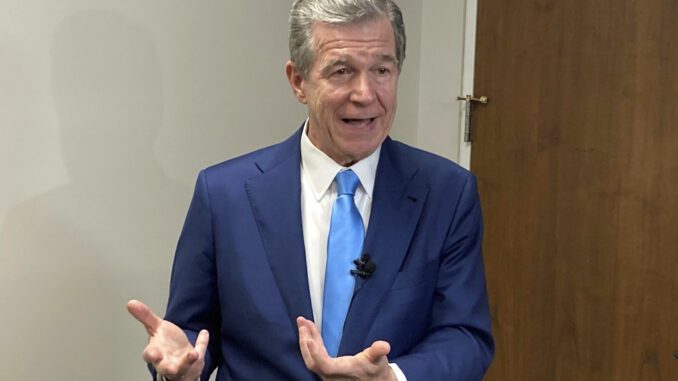
RALEIGH — On Aug. 15, the House Election Law and Campaign Finance Reform Committee met to discuss a preferred committee substitute (PCS) to Senate Bill 747, a bill making various changes to the state’s election laws.
Within a few days of the committee meeting, the bill was passed by both chambers of the General Assembly and was sent to Democratic Gov. Roy Cooper on Aug. 18.
When the first version of the bill was announced in June, Cooper personally responded on X, the platform formerly known as Twitter, by writing, “And here they go with advice from election deniers and fraud perpetrators. Don’t be fooled. This isn’t about protecting elections. It’s about rigging them to help Republicans. – RC.”
Given Cooper’s past statements, he will more than likely veto the current measure, triggering another veto override by the General Assembly.
The 42-page PCS includes numerous changes to conform with state and federal laws and covers a wide range of topics including mail-in absentee ballots, closing loopholes in same-day voter registration, removing foreign citizens from voter rolls, and challenges to ballots and registrations, as well as polling place issues, such as polling place judges and rules related to poll observers.
Key provisions and changes include treating early voting more like in-person voting on Election Day. One-stop absentee voting would be renamed and simply called early voting.
Under the bill, the return time to county boards of election for mail-in absentee ballots would be 7:30 p.m. on election night regardless of postmark. Military and overseas voters would be the exception to that requirement. Currently, those ballots can be returned by 5 p.m. on the third day following an election if the ballot is postmarked on or before the day of the election.
Challenges to mail-in absentee ballots received by the new deadline can occur no later than 5 p.m. on the fifth business day after the election. Any registered voter of the same county as the absentee voter can challenge that absentee voter’s ballot.
The bill requires the N.C. State Board of Elections (NCSBE) to include a bar code or a unique identifier on each container-return envelope for mail-in absentee ballots for tracking purposes.
A process for addressing deficiencies in absentee ballots is included in the proposed legislation wherein a county board must notify a voter if their container-return envelope contains a curable deficiency with examples of a voter failing to sign the voter certification, signing in the wrong spot or if they didn’t include a copy of their photo ID.
In order to correct a deficiency and have the vote counted, the voter would need to send their documentation in no later than the end of business on the business day before canvass is conducted. With regard to photo ID, a voter can cure their ballot by sending a file or image via email to their county board of elections.
Current election law says the chief judge and the judges have to stay at the voting place from the time from the start through the conclusion of their duties. The bill would remove that requirement so long as the positions are filled throughout the day by an appropriate official.
If passed, the bill creates a pilot program in certain counties to use signature verification software for verifying signatures on absentee ballots.
The NCSBE will also be required to retain and preserve voted ballots, election results tapes and executed ballot applications for 22 months after an election or as otherwise specified in federal law, whichever is greater.
The provision prohibiting the NCSBE from accepting direct or indirect private monetary donations or in-kind contributions for the purpose of conducting elections or employing individuals on a temporary basis in the former version of the bill remains intact in the PCS.
The majority of the provisions and changes in the PCS would be in effect for the upcoming presidential election year, taking effect on Jan. 1, 2024.
One section adds two new criminal penalties that would take effect on Dec. 1, 2023.
If the bill becomes law, it would be a Class 1 misdemeanor for any person to impersonate a precinct official while carrying out duties in registering voters or conducting an election and for anyone other than an NCSBE or a county board employee to place any kind of identifier on any absentee ballot request form in order to track it.
Another section would add a “knowing requirement” to the Class I felony for a person voting in an election without their right of citizenship having been restored.
Additionally, any violations in the administration of election laws, fraud and irregularities in elections are to be reported by the NCSBE to the State Bureau of Investigation for further investigation and prosecution. County boards of election would be required to cooperate with any investigation.
